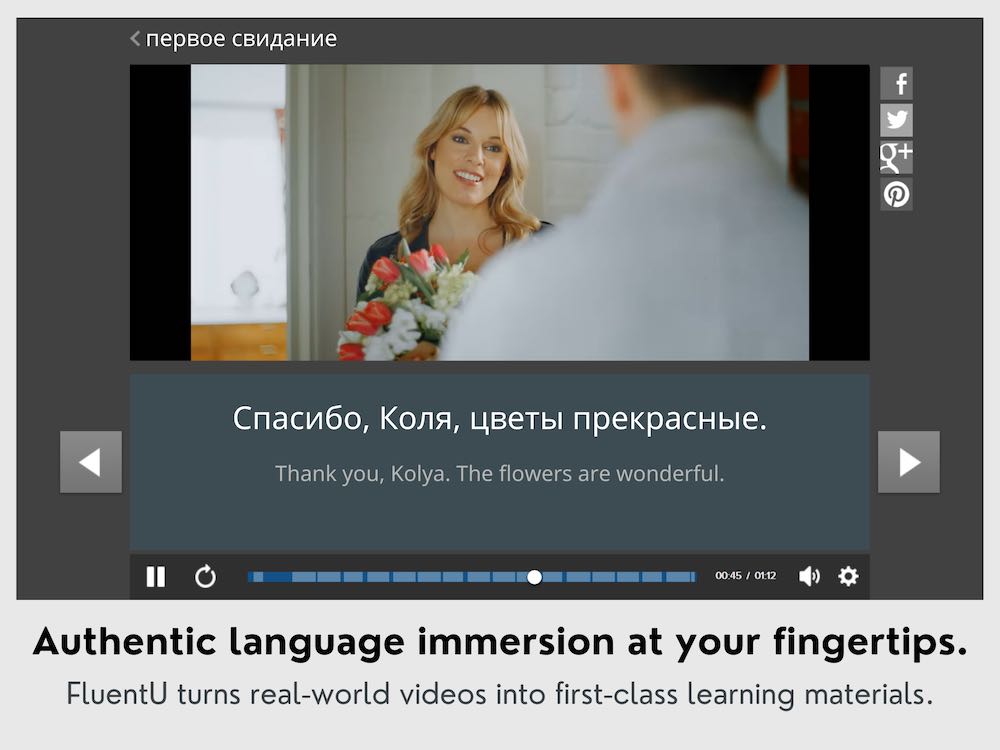
Learn Russian with Movies: 23 Great Russian Films to Add to Your Watchlist
If you’re learning Russian and looking for a cheap and easy way to improve your language skills, movies are a great option.
They can help you build your vocabulary, get exposed to authentic Russian conversations and hear accents and intonation from native speakers.
Plus, it has to be one of the most fun methods of learning a language at home!
Read on to get 23 great films you can queue up today and see why you should learn Russian with movies.
Contents
- 1. “Баллада о солдате” (“Ballad of a Soldier”)
- 2. “Сталкер” (“Stalker”)
- 3. “Солярис” (“Solaris”)
- 4. “Брат” (“Brother”)
- 5. “Утомлённые солнцем” (“Burnt by the Sun”)
- 6. “Левиафан” (“Leviathan”)
- 7. “Стачка” (“Strike”)
- 8. “Вор” (“The Thief”)
- 9. “Евдокия” (“Evdokiya”)
- 10. “Комиссар” (“The Commissar”)
- 11. “Елена” (“Elena”)
- 12. “Карнавал” (“Carnival”)
- 13. “Русский ковчег” (“Russian Ark”)
- 14. “Стиляги” (“Hipsters”)
- 15. “Каменный цветок” (“The Stone Flower”)
- 16. “Я буду рядом” (“I’ll Be Around”)
- 17. “Царь” (“Tsar”)
- 18. “Спутник” (“Sputnik”)
- 19. “Довлатов” (“Dovlatov”)
- 20. “Майор Гром: Чумной Доктор” (“Major Grom: Plague Doctor”)
- 21. “Враги” (“Enemies”)
- 22. “Сталинград” (“Stalingrad”)
- 23. “Ирония судьбы. Продолжение” (“The Irony of Fate 2”)
- Why Learn Russian with Movies?
- And One More Thing...
Download: This blog post is available as a convenient and portable PDF that you can take anywhere. Click here to get a copy. (Download)
1. “Баллада о солдате” (“Ballad of a Soldier”)
Year: 1959
Genre: War drama/Romance
This film focuses on the role of love during war. Set in WWII, it follows a Red Army soldier as he goes home and falls in love along the way.
The dialogue isn’t terribly fast and the film is available on YouTube with English subtitles, so it’s a good option for any level of language learner.
Much of the vocabulary is pretty general, but there are also some military terms scattered about that you can learn.
Where to watch: YouTube | The Criterion Channel
2. “Сталкер” (“Stalker”)
Year: 1979
Genre: Drama/Sci-Fi
This is a Soviet classic by director Andrei Tarkovsky. Though it has some science fiction elements, it’s primarily a drama about an expedition to a mysterious area known as the “Zone,” said to fulfill desires. A lot of fighting occurs along the way.
It’s appropriate for any level of language learner to learn and practice general vocabulary. There’s not a lot of dialogue, so you’ll have plenty of time to practice any words you don’t already know.
Where to watch: Prime Video | Max | Apple TV | Google Play | YouTube | Vudu
3. “Солярис” (“Solaris”)
Year: 1972
Genre: Drama/Sci-Fi
This film is based on the 1961 sci-fi novel of the same name. It follows the emotional crises of several crew members aboard a space station. It’s widely considered a classic sci-fi film.
It’s best for intermediate and advanced learners and is great for learning space-related vocabulary. While the dialogue isn’t fast, it uses some advanced words that may overwhelm beginning learners.
If you have trouble following the plot, you might also try watching the 2002 American film “Solaris.” While the two movies aren’t identical, they’re based on the same novel, so it could help familiarize you with the plot and then follow along in Russian.
Where to watch: Prime Video | Max | Apple TV | Google Play | YouTube | Vudu
4. “Брат” (“Brother”)
Year: 1997
Genre: Action/Crime drama
Freshly released from the military, Danila hopes to have a fresh start in St. Petersburg. There, he gets caught up in the criminal world that his older brother is involved in. A sequel (“Брат 2″/”Brother 2”) was released in 2000.
Due to the mature nature of the film, it’s best for adult learners. Since it leans heavily on vocabulary that most beginning students don’t use (or need), it’s also probably best for more advanced learners.
However, anyone who chooses to watch this movie will learn slang and all sorts of vocabulary related to crime and the military.
Where to watch: Prime Video
5. “Утомлённые солнцем” (“Burnt by the Sun”)
Year: 1994
Genre: War drama
“Burnt by the Sun” is an award-winning film that depicts the personal impact of the Great Purge of the late 1930s in which many government officials and Communist Party members were killed as “saboteurs.” In the movie, an Army commander and his family are vacationing in the country when his wife’s lost love arrives, which leads to trouble for the commander.
While the dialogue isn’t easy, this movie is worth the effort for any language learner who invests in the subtitled version.
This film is a good option for learning political and military vocabulary, but it’ll also help you learn a lot about this important part of Russian history.
Where to watch: Prime Video | Apple TV | Google Play | YouTube | Vudu
6. “Левиафан” (“Leviathan”)
Year: 2014
Genre: Crime drama
In this film, a man from a coastal town battles a corrupt mayor to try to prevent his house from being demolished. Though the plot may seem simple enough, it actually includes some criticism of contemporary Russia.
While the subtitles will make it easy for any level of language learner to follow, this film is most appropriate for learners who already have some knowledge of contemporary Russia.
There’s plenty of general vocabulary in “Leviathan,” but you can also pick up some legal terms.
Where to watch: Prime Video | Apple TV | Google Play | YouTube | Vudu
7. “Стачка” (“Strike”)
Year: 1925
Genre: Drama
Here’s a movie for your reading skills! This is a silent film, so you’ll be reading a few Russian words at a time throughout the movie. It tells the story of a strike by factory workers in 1903 during the pre-Bolshevik Revolution period.
When a factory worker is accused of stealing a piece of machinery, he ends up taking his own life. As a result, the other workers rise up against the Tsarist regime. The government officials take strong measures to end the strike.
This is a good one for beginner Russian learners who want to dip their toes into authentic Russian culture and film history.
Where to watch: YouTube
8. “Вор” (“The Thief”)
Year: 1997
Genre: Crime/Drama
This film was nominated for a Golden Globe and an Academy Award. It takes place after the end of World War II and tells the story of a young widowed mother and her six-year-old son who are left without a place to live.
They ride the train in search of a new home and meet a veteran Soviet officer who turns out to be a thief. Despite his criminal nature, the man steps into the husband and father role.
It’s a touching film that tells the difficult story of the economic times for many Russians after the war, and how families had to go to drastic measures to survive.
Where to watch: Prime Video | YouTube
9. “Евдокия” (“Evdokiya”)
Year: 1961
Genre: Drama
This black-and-white classic is based on a Russian novel by Vera Panova. It shows Russia as it was from the 1920s to the 1960s, and its inhabitants, who mostly lived in small towns.
This film is about a married couple and their foster children. Evdokim is a silent, hardworking factory worker and Evdokiya is a passionate and beautiful young housewife who hasn’t yet gotten over her first love.
This film is great for Russian students as the speech is slow and the narrator helps viewers understand the context of the movie. Plus, you can learn words that were commonly spoken by small-town residents in the early- to mid-1960s.
Where to watch: Prime Video | YouTube
10. “Комиссар” (“The Commissar”)
Year: 1967
Genre: War drama
This film, based on a short story by Vasily Grossman, was banned by the Soviet Union for 20 years because of its messages on anti-Semitism and women’s rights. It wasn’t screened until the late ’80s, after which it was renowned internationally.
Clavdia Vavilova, a pregnant commissar (a Communist political worker) is sent to live with a Jewish family. At first, she and the family strongly dislike each other due to political beliefs, but they soon realize that they have a lot in common and grow extremely fond of each other.
This is the perfect chance to learn Communist terms as well as words that describe the Russian Civil War.
Where to watch: Prime Video | YouTube
11. “Елена” (“Elena”)
Year: 2011
Genre: Drama
In this thought-provoking drama directed by Andrey Zvyagintsev, Elena is a middle-aged woman who marries a wealthy businessman. Her marriage to Vladimir creates tension with her son from a previous marriage, and when Vladimir falls seriously ill, complex moral choices come to the forefront.
“Elena” is most suitable for intermediate to advanced learners due to its intricate dialogue and use of colloquial language.
By watching this film, you’ll get an interesting look at the nuances of Russian society, family relationships and the moral dilemmas faced by its characters.
Where to watch: Apple TV | Kanopy
12. “Карнавал” (“Carnival”)
Year: 1982
Genre: Romantic comedy/Drama
In Russia, aspiring actors and actresses move to the capital, Moscow, to pursue their dreams. This is the story of a young girl who leaves her small town to move to the big city, where she finds and is used by a boyfriend.
See the outfits, hear the music and poetry and discover the terms that were popular in the ’80s, as well as the entertainment Russia made during that time.
In the first part of the movie, the protagonist is still a student, so you can learn words that describe school and college life. The later parts showcase her aspiring acting career, sharing terms particular to that industry.
Where to watch: Soviet Movies Online
13. “Русский ковчег” (“Russian Ark”)
Year: 2002
Genre: Experimental historical drama
“Russian Ark” is a remarkable film known for its breathtaking single-take cinematography. It takes viewers on a visually stunning journey through the State Hermitage Museum in St. Petersburg, spanning three centuries of Russian history.
As the camera glides through the museum’s grand halls, you’ll witness historic events, iconic artworks and interactions with various characters, offering a unique perspective on Russia’s cultural heritage.
The film showcases formal and historical speech. It’s most suitable for advanced learners who can appreciate its cultural and linguistic richness, although learners at lower levels can still benefit from its visual and historical aspects with subtitles or support.
Where to watch: YouTube | Kanopy | Kino Now
14. “Стиляги” (“Hipsters”)
Year: 2008
Genre: Drama/Musical/Romance
This fun musical will keep your toes tapping to the entertaining (and educational) music. Set in the 1950s, it follows members of the hipster subculture who love American music and are eager to express themselves despite Soviet norms.
This is a good movie for any level of language learner. While beginning students might not catch all the words, the music will get stuck in your head, which will help you remember vocabulary.
From watching, you can pick up vocabulary related to the Soviet era as well as music and culture terms.
Where to watch: Kanopy
15. “Каменный цветок” (“The Stone Flower”)
Year: 1946
Genre: Adventure/Drama
This film is based on a folk tale that was collected and reworked by Pavel Bazhov and published in 1938. It offers a relatively light plot that involves a talented stone carver named Danila who embarks on a mystical journey to master his craft.
While there are subtitles to help you along, it’s an older film, so this would probably be best for intermediate and advanced learners who are in a better position to contend with more complex words.
From “The Stone Flower,” you can pick up some general vocabulary while learning about Russian folklore, traditions and rich storytelling. It’s also a great way to explore classic Soviet cinema and understand the cultural significance of such films in Russian history.
Where to watch: Youtube
16. “Я буду рядом” (“I’ll Be Around”)
Year: 2012
Genre: Drama
This film presents a great look at the so-called “new Russians,” or middle-class and wealthier individuals who live a much more comfortable life than Russians of the past.
The main character, Inna, is a single mom who works as a manager in a restaurant in Moscow. When she finds out that she has a fatal brain tumor, she must come to terms with the end of her life and find foster parents for her six-year-old son.
This is a great chance to hear how adults speak to children in Russia and the movie gives an accurate portrayal of modern family life in Russia.
Where to watch: YouTube
17. “Царь” (“Tsar”)
Year: 2009
Genre: Historical drama
This film tells the story of Ivan IV Vasilyevich, better known throughout history as “Ivan the Terrible.” It follows him as he comes to believe that he’s trusted with a holy mission to rule Russia, and crushes his enemies in his quest to become Tsar before the Last Judgement (which he believes is coming).
In this film, you’ll hear words to describe religion, forgiveness, sin and duty. You’ll also get more familiar with the Old Russian language and learn terms used in the 1500s.
The speech is slow-paced, which provides a chance for beginner and intermediate learners to boost their comprehension skills.
Where to watch: Prime Video | YouTube
18. “Спутник” (“Sputnik”)
Year: 2020
Genre: Sci-Fi/ Horror
Set during the Cold War, “Sputnik” tells the story of a Soviet cosmonaut who returns to Earth with a parasitic extraterrestrial organism inside him. As the government investigates, a psychologist is brought in to assess the situation.
This film is suitable for intermediate to advanced Russian learners. It’s an entertaining way to get exposed to authentic Russian conversation, especially for sci-fi fans.
It exposes viewers to scientific and military terminology and lots of (very dramatic) dialogue.
Where to watch: Prime Video | Apple TV | Google Play | YouTube | Vudu
19. “Довлатов” (“Dovlatov”)
Year: 2018
Genre: Biographical drama
“Dovlatov” portrays the life of Sergei Dovlatov, a Soviet dissident writer, during the 1970s Leningrad (now Saint Petersburg). The film immerses viewers in the atmosphere of artistic repression and censorship under the Soviet regime.
Russian learners will benefit from its historical and cultural context, which includes literary discussions and nuanced dialogues, offering insights into the language of intellectuals of that era.
It’s best suited for advanced learners who can grasp complex themes and language nuances. For intermediate learners, subtitles may be helpful to fully appreciate the film’s rich storytelling and language.
Where to watch: Netflix
20. “Майор Гром: Чумной Доктор” (“Major Grom: Plague Doctor”)
Year: 2021
Genre: Action/Crime
This film is based on the popular Russian comic book series. It follows Major Grom, a no-nonsense police officer in St. Petersburg, as he battles a mysterious vigilante known as the Plague Doctor.
The film offers a contemporary glimpse into urban Russian life, including colloquial language and modern slang. It presents an opportunity to hone conversational Russian and gain exposure to Russian pop culture.
A proficiency level of intermediate to advanced is recommended for full comprehension without subtitles.
Where to watch: Netflix
21. “Враги” (“Enemies”)
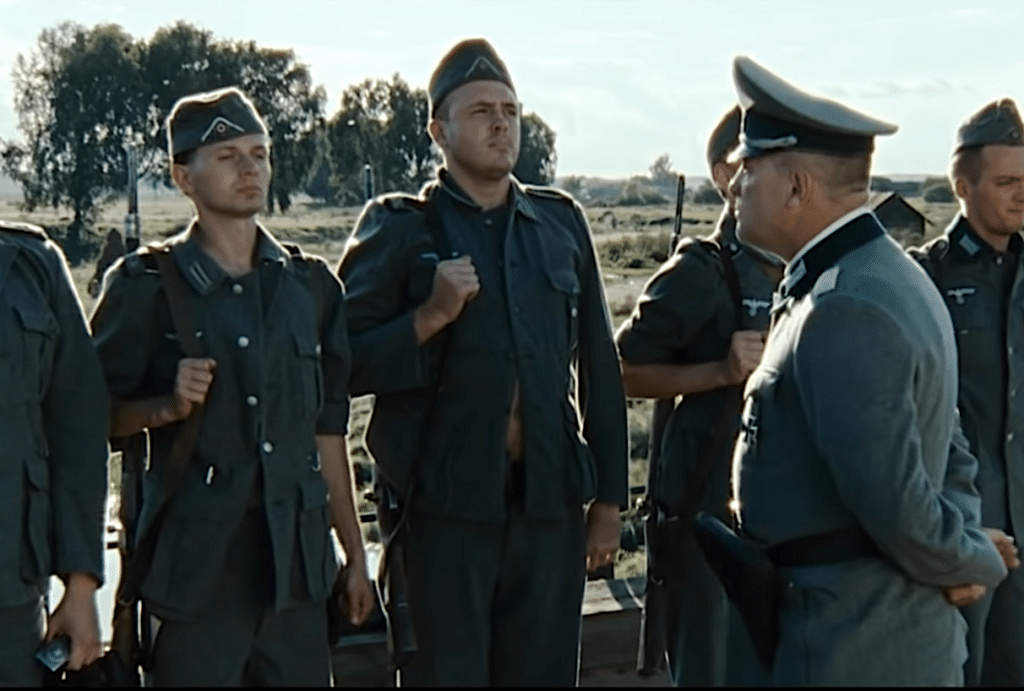
Year: 1953
Genre: Drama
“Враги” tells the story of what happened in 1942 in Belorussia, a country that was part of the USSR. It takes place in a small town after occupation by the Germans. Both sides are coming to terms with the new normal—the Germans learn Russian while interacting with the residents.
However, when a young Russian blows up a German train, the choice has to be made to execute the boy, even if that means ending the calm that’s been established.
As the Germans in the film learn Russian, you can hear basic words and phrases for beginners. Also, you’ll learn vocabulary having to do with the war and the era.
Where to watch: YouTube
22. “Сталинград” (“Stalingrad”)
Year: 2013
Genre: Action/War drama
“Stalingrad” is a popular 2013 epic action war film that depicts the 1942 Battle of Stalingrad. The film combines intense action sequences with human drama, showcasing the resilience and sacrifices of soldiers and civilians during this historic battle.
With plenty of action to entertain all viewers in this movie, any level of language learner should be able to pick up enough words to follow the story.
You’ll pick up plenty of vocabulary related to war and the military, and you’ll also learn about a pivotal battle from WWII.
Where to watch: Prime Video | Apple TV | Vudu | Microsoft
23. “Ирония судьбы. Продолжение” (“The Irony of Fate 2”)
Year: 2007
Genre: Romantic comedy
This is a sequel to the 1975 movie “Ирония судьбы, или С лёгким паром!” (“The Irony of Fate, or Enjoy Your Bath!”). It depicts the romantic misadventures of the children of the characters from the original film. Set during the Christmas season, it’s a fun, festive option.
It might be a little difficult to track down an English-subtitled version of this movie, so it might be best for intermediate and advanced Russian learners.
Those who watch will learn some seasonal vocabulary as well as more general terms. You may need to use a VPN to watch the version linked below, depending on your location.
Where to watch: Prime Video
Why Learn Russian with Movies?
There are many reasons why you should watch Russian movies to learn the language. Here are just a few:
- Movies provide you with thematic vocabulary based on genre or topic. Movie genres and plots are diverse, and so is the vocabulary that they use. Looking to learn slang? Pick a current movie with a contemporary setting. Want to learn historical terms? Try a period piece.
- Movies hold your attention by entertaining you. It’s easier to get in two hours of Russian practice when it masquerades as entertainment. Rather than trying to maintain your focus as you stare, glassy-eyed, at a textbook, why not let a movie entertain and educate you?
- Movies immerse you in the Russian language. Sure, TV can be great for learning if you have time constraints, but the added length of movies provides more of a chance for you to really get into them. Since immersion is really important in learning a language naturally, this is a great way to get some serious time studying Russian without leaving your couch.
If you have trouble keeping up with a movie and want to watch shorter clips, the FluentU program has Russian videos with interactive captions and other learning tools. You can use these to prepare yourself for watching full-length movies.
FluentU takes authentic videos—like music videos, movie trailers, news and inspiring talks—and turns them into personalized language learning lessons.
You can try FluentU for free for 2 weeks. Check out the website or download the iOS app or Android app.
P.S. Click here to take advantage of our current sale! (Expires at the end of this month.)
If you need more options, check out these great Russian movies on Amazon’s Prime Video, these Russian movies and TV shows on Netflix or these sites for finding Russian movies with Russian subtitles.
With so many great options to take advantage of, you won’t run out any time soon.
Pop some popcorn, sit back, relax and watch your Russian grow!
Download: This blog post is available as a convenient and portable PDF that you can take anywhere. Click here to get a copy. (Download)
And One More Thing...
If you love learning Russian and want to immerse yourself with authentic materials from Russia, then I should also tell you more about FluentU.
FluentU naturally and gradually eases you into learning the Russian language and culture. You'll learn real Russian as it's spoken by real Russian people!
FluentU has a very broad range of contemporary videos. Just a quick look will give you an idea of the variety of Russian-language content available on FluentU:
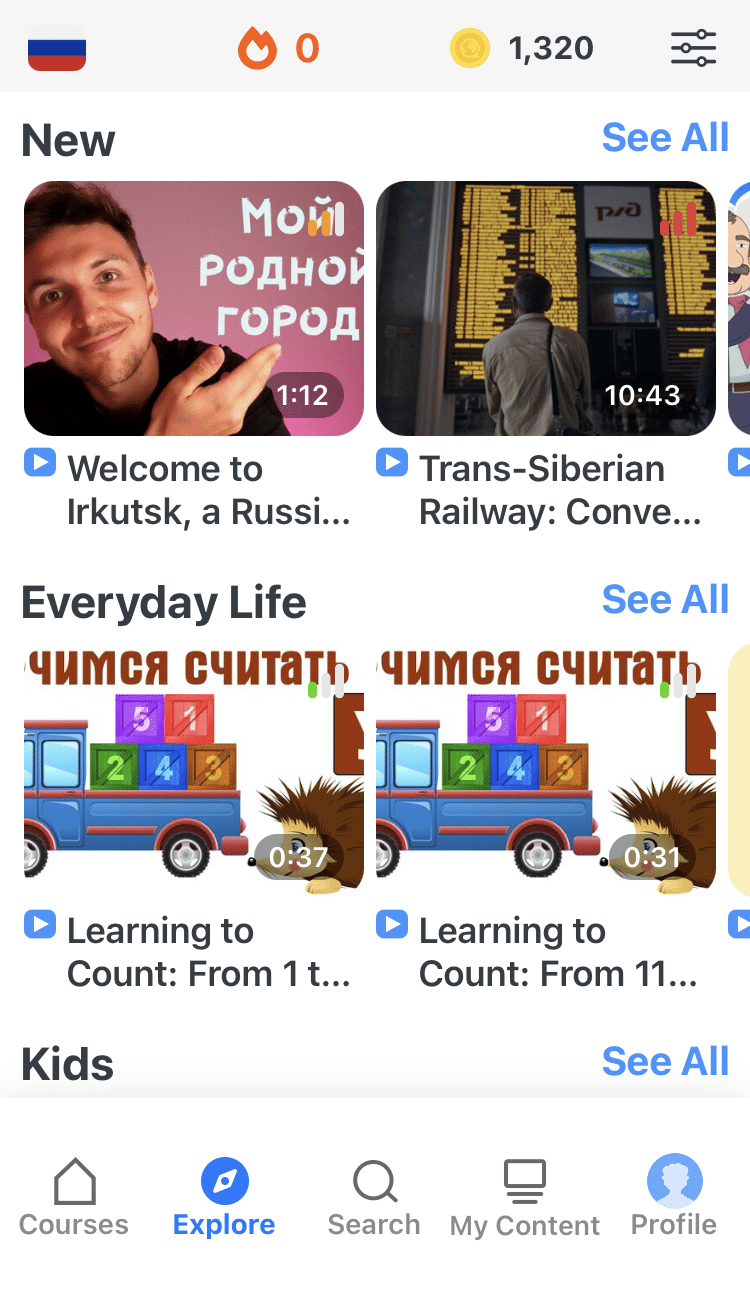
FluentU makes these native Russian videos approachable through interactive transcripts. Tap on any word to look it up instantly.
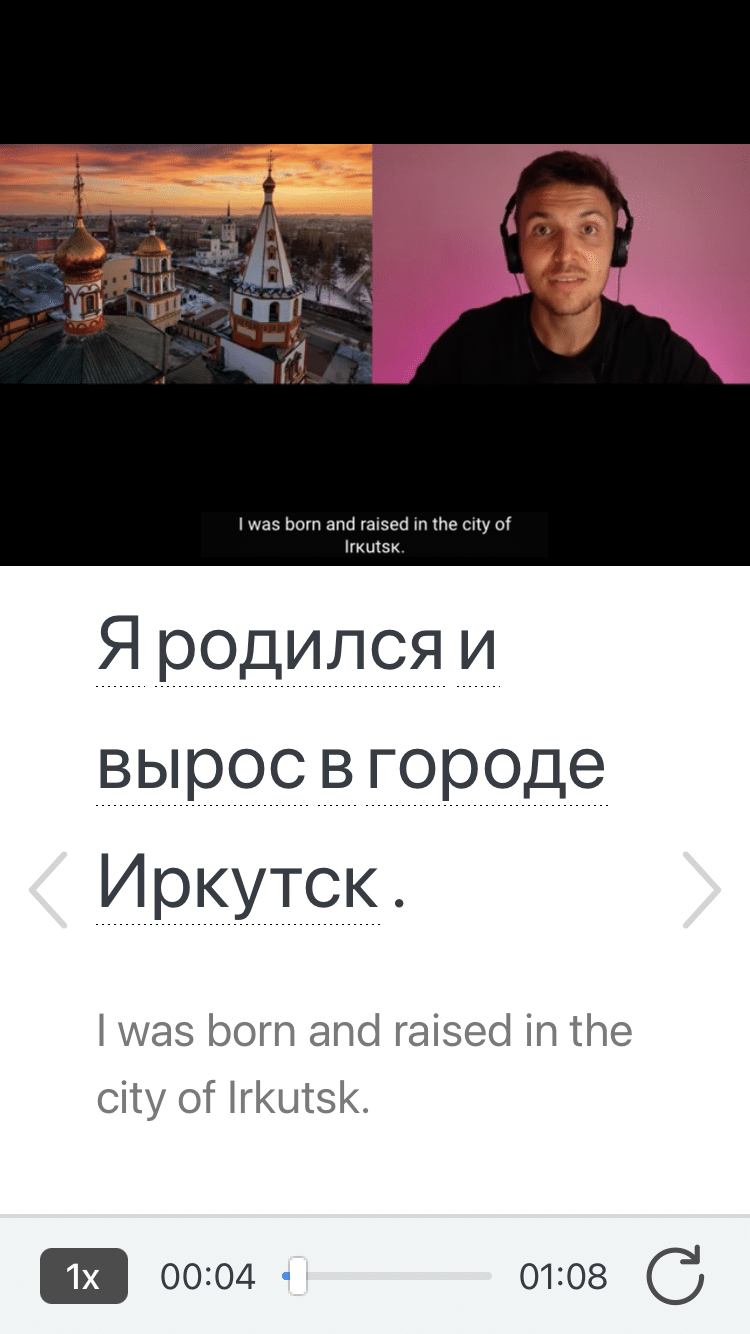
Access a complete interactive transcript of every video under the Dialogue tab. Easily review words and phrases with audio under Vocab.

All definitions have multiple examples, and they're written for Russian learners like you. Tap to add words you'd like to review to a vocab list.
And FluentU has a learn mode which turns every video into a language learning lesson. You can always swipe left or right to see more examples.
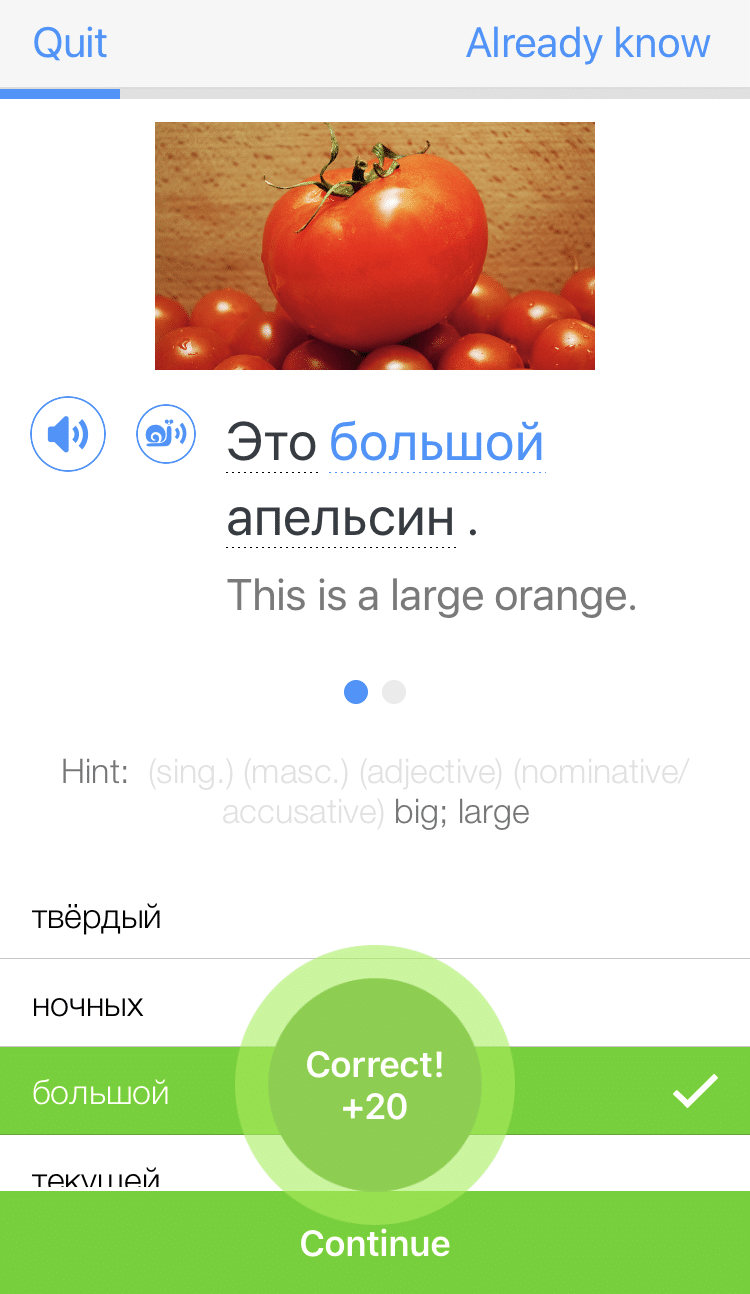
The best part? FluentU keeps track of your vocabulary, and gives you extra practice with difficult words. It'll even remind you when it’s time to review what you’ve learned. You'll have a 100% personalized experience.
Start using the FluentU website on your computer or tablet or, better yet, download the FluentU app from the iTunes or Google Play store. Click here to take advantage of our current sale! (Expires at the end of this month.)
